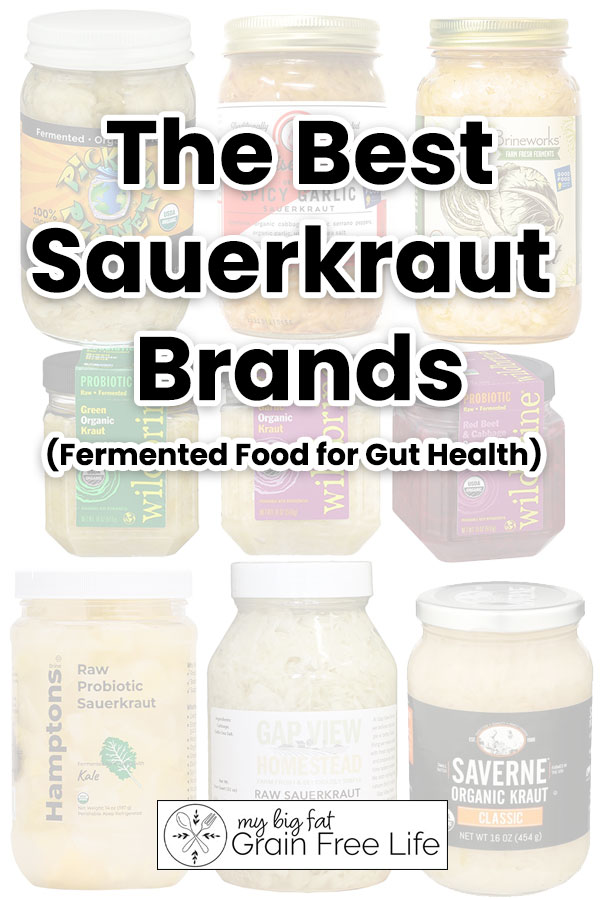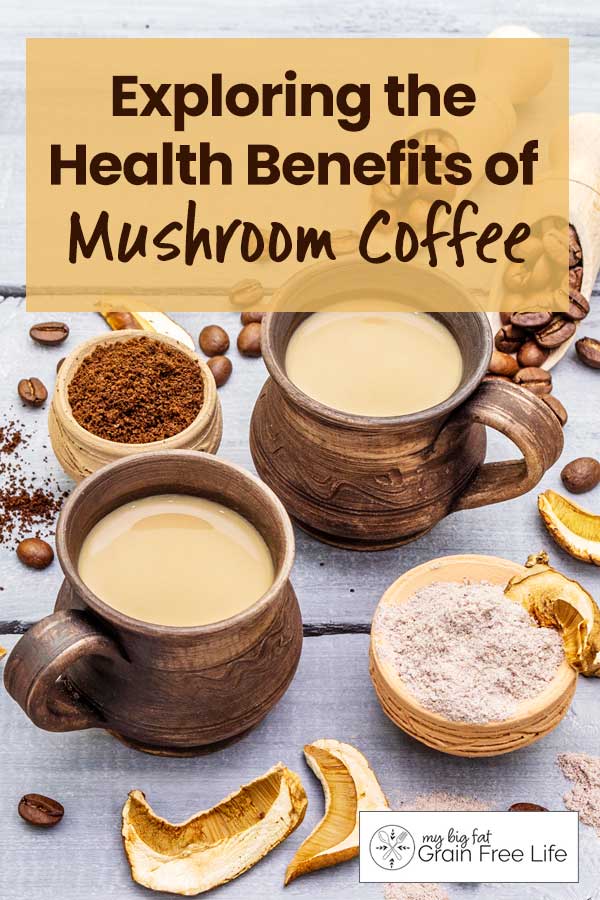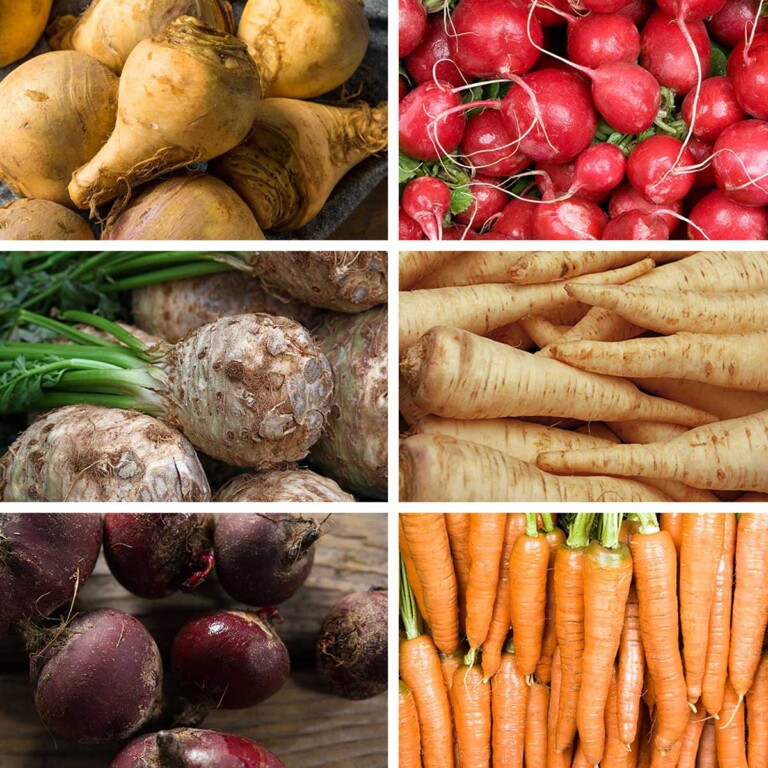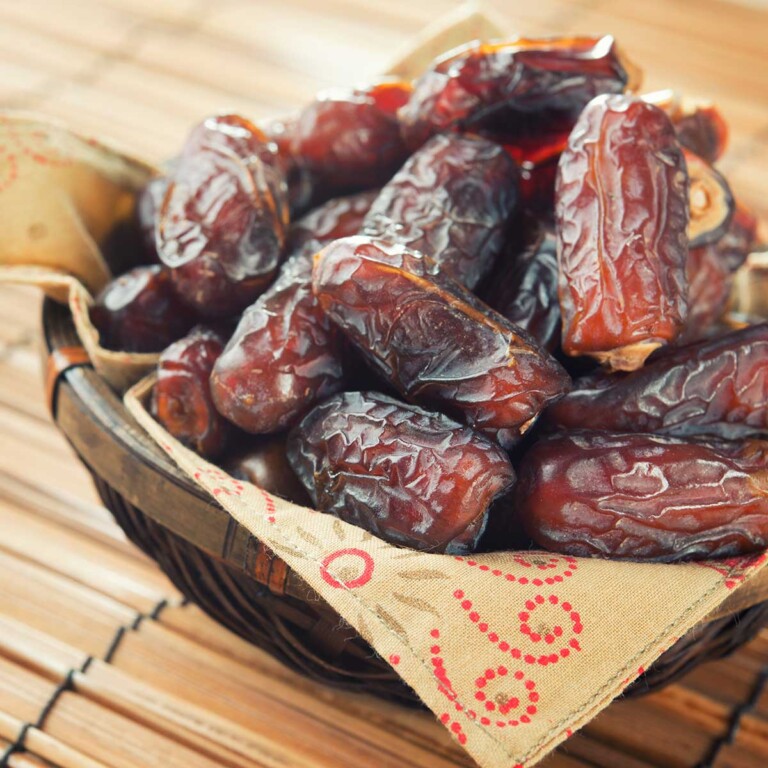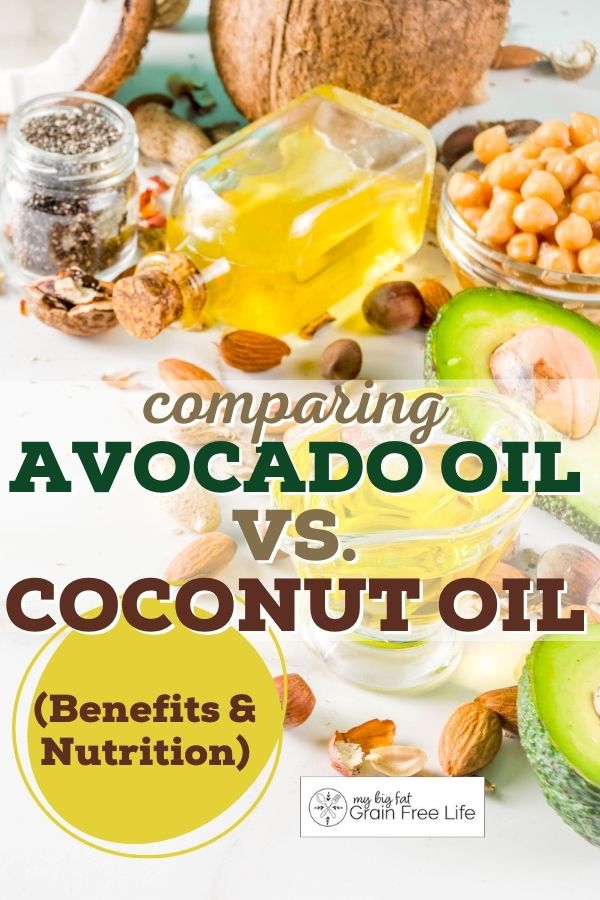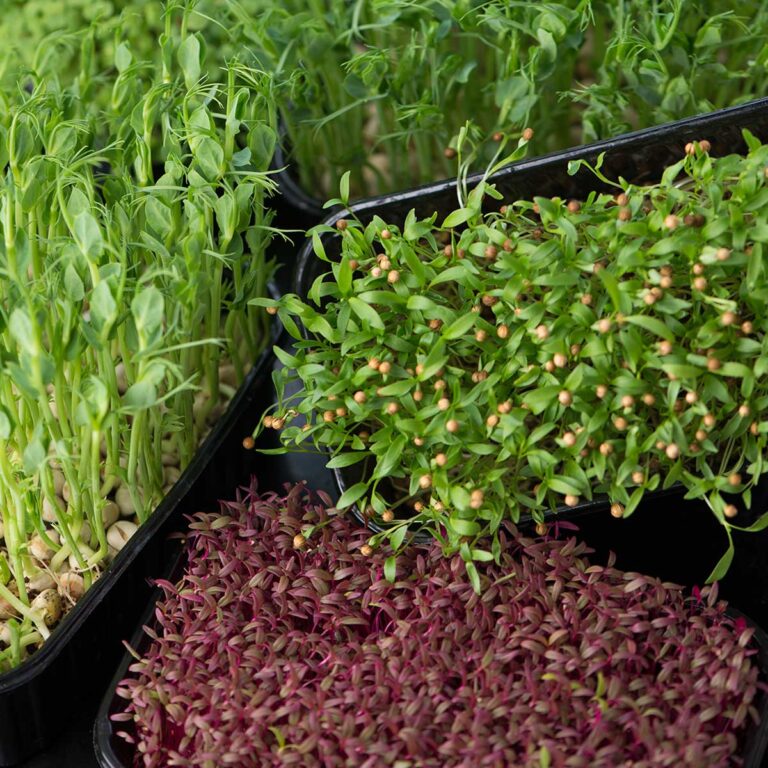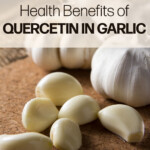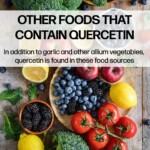The Powerful Health Benefits of Quercetin in Garlic
This post may contain affiliate links. If you make purchase after clicking a link, I may receive a commission at no extra cost to you.
Last Updated on February 7, 2024
Garlic is used to enhance the flavor of food, but also comes with loads of health benefits! Learn about how quercetin in garlic can help boost immune function, support brain health, protect against cardiovascular disease, and even help you fight a cold or the flu.

Quercetin in Garlic
Garlic (Allium sativum L.) has long been renowned for its pungent flavor and aromatic properties in cooking, but its health benefits go far beyond its culinary uses.
One of the key substances responsible for the powerful health properties of garlic is quercetin. Let’s take a look at the science behind quercetin and its role in promoting optimal health, with a particular focus on its presence in garlic.
What is Quercetin and Why is it Important?
Quercetin belongs to a class of compounds called flavonoids, which are widely distributed in the plant kingdom, including fruits, vegetables, and herbs.
It is a potent antioxidant, meaning that it helps to neutralize harmful molecules called free radicals that can damage cells and contribute to chronic diseases such as heart disease and cancer.
Additionally, quercetin has been found to possess anti-inflammatory, antiviral, and anticancer properties, making it a highly valuable compound for overall health and well-being.
Understanding the Science Behind Quercetin
Research on quercetin has revealed fascinating insights into its mechanisms of action in the body. One of the key ways quercetin exerts its health benefits is by modulating various signaling pathways involved in inflammation, oxidative stress, and immune function.
By interfering with these pathways, quercetin helps to reduce inflammation, protect cells from oxidative damage, and enhance the body’s immune response. These effects have been linked to a wide range of health benefits, including improved cardiovascular health, enhanced brain function, and reduced risk of chronic diseases.
Quercetin and Cancer Prevention
Quercetin has been found to exhibit anti-cancer properties by inhibiting the growth of cancer cells and inducing apoptosis, or programmed cell death, in tumor cells. Its ability to target multiple signaling pathways involved in cancer development makes it a promising candidate for future anti-cancer therapies.
Quercetin Increases Sports Performance & Recovery
Athletes and those into fitness have started to incorporate quercetin into their training regimens due to its potential to improve endurance, reduce exercise-induced inflammation, and enhance post-exercise recovery.
By reducing muscle damage and inflammation, quercetin may help athletes push their limits and recover faster, leading to improved performance.
Quercetin Boosts the Immune System
Numerous studies have shown that quercetin has positive effects on immune health, promoting the function of various immune cells and enhancing the body’s ability to fight off infections.
Additionally, quercetin supports the body’s natural defense mechanisms by modulating the release of inflammatory cytokines and promoting the production of antioxidants.
By bolstering immune function, quercetin helps to defend the body against a wide range of diseases, from common colds to more serious conditions.
Quercetin’s Anti-Inflammatory Properties
Quercetin has been found to possess potent anti-inflammatory properties by inhibiting the production of inflammatory mediators and suppressing the activation of pro-inflammatory pathways.
By reducing chronic inflammation, quercetin helps to promote better overall health and reduce the risk of chronic disease.
Quercetin & Cardiovascular Health
Quercetin has been extensively studied for its cardioprotective effects. It helps to improve heart health by reducing blood pressure, lowering LDL cholesterol levels, and improving blood vessel function.
By enhancing blood flow and reducing oxidative stress in the cardiovascular system, quercetin provides comprehensive support for maintaining optimal cardiovascular health.
Quercetin as a Natural Antioxidant
Quercetin acts as a powerful antioxidant, neutralizing free radicals and protecting cells from oxidative damage. Its antioxidant activity helps to maintain the overall balance of oxidative stress in the body, promoting healthy aging and reducing the risk of age-related diseases.
Quercetin and its Effects on Brain Health
Quercetin has shown promise in supporting brain health by crossing the blood-brain barrier and exerting various neuroprotective effects.
It helps to combat neuroinflammation, protect neurons from oxidative damage, and enhance cognitive function. Emerging research suggests that quercetin may have potential applications in the prevention and management of neurodegenerative diseases such as Alzheimer’s and Parkinson’s disease.
How Our Bodies Get Quercetin
When we eat these quercetin-rich foods, the quercetin molecules are absorbed through the lining of our small intestine into our bloodstream. From there, they can be distributed throughout the body to various tissues and organs.
Enhancing Absorption of Quercetin
The absorption of quercetin can be enhanced by consuming it along with other nutrients:
- Vitamin C Foods: Consuming quercetin-rich foods (see a list further down the page) with sources of vitamin C, such as citrus fruits or bell peppers, can improve its absorption.
- Nuts and Seeds: Pairing quercetin-rich foods with nuts or seeds such as almonds, walnuts, chia seeds, or flaxseeds can boost the absorption of quercetin.
- Olive Oil: Drizzling olive oil over your meals containing quercetin-rich foods may help improve the absorption of this flavonoid.
- Black Pepper: Adding a pinch of black pepper to dishes with quercetin-rich ingredients can aid in the absorption of quercetin.

Quercetin in Garlic
My favorite source for quercetin is garlic! I have been known to eat whole garlic cloves stuffed in olives as if they were candy. Let’s take a look at the quercetin in garlic.
How Much Quercetin is Found in Garlic?
On average, raw garlic bulbs can provide approximately 0.05-0.15 grams of quercetin per 100 grams. Cooking garlic slightly reduces its quercetin content, but it remains a valuable source of this health-promoting compound even after cooking.
Is Garlic High In Quercetin?
Yes, garlic can be considered high in quercetin compared to many other foods. Its quercetin content is particularly impressive when considering its relatively low caloric density.

Quercetin in Different Forms of Garlic
- Raw garlic cloves: Raw fresh garlic cloves are one of the best sources of quercetin among all the different forms of garlic. They contain higher concentrations of quercetin compared to other processed forms.
- Crushed garlic: When raw garlic cloves are crushed or chopped, it helps release more quercetin into the food. Therefore, crushed garlic has a higher concentration of quercetin compared to whole cloves.
- Fermented garlic: Fermented foods have been found to enhance the bioavailability and concentration of certain compounds like quercetin through microbial activity during fermentation processes. Therefore, fermented garlic can have a higher content of quercetin compared to non-fermented garlic.
- Garlic powder: During the processing of garlic into powder form, some amount of quercetin may be lost due to heat exposure and oxidation. However, there can still be a significant amount of quercetin present in garlic powder.
- Granulated garlic: Granulated garlic is similar to garlic powder as it is also made from dried and ground cloves. While some loss of quercetin might occur during processing, there can still be a notable amount present in granulated garlic.
- Garlic peels: The peels of garlic contain quercetin, but the concentration may be lower compared to other parts of garlic.
You might also enjoy: Air Fryer Roasted Garlic

The Role of Garlic in Traditional Medicine
Traditional medicinal practices in various cultures have employed garlic for the treatment of conditions ranging from infections to cardiovascular disorders. The presence of quercetin in garlic contributes significantly to its therapeutic potential, making it a valuable ingredient in traditional remedies.
Garlic is Antimicrobial, Antiviral & Antifungal
Garlic contains a compound called allicin, which has been found to have potent antibacterial, antiviral, and antifungal effects.
In ancient times, garlic was often used as a natural remedy for infections, including respiratory tract infections, skin infections, and even intestinal parasites. The antimicrobial properties of garlic are believed to be one of the reasons why it has been highly valued in traditional medicine.
Garlic Promotes a Healthy Cardiovascular System
Studies have shown that garlic can help lower blood pressure and reduce cholesterol levels, which are risk factors for heart disease.
In traditional medicine, garlic has been used to treat various cardiovascular conditions, such as hypertension and atherosclerosis. The sulfur compounds found in garlic are thought to be responsible for its cardiovascular effects, as they help relax blood vessels and improve blood flow.
Garlic is Immune-Boosting
Garlic is rich in antioxidants, which help protect the body against oxidative stress and strengthen the immune system.
In traditional remedies, garlic has been used to enhance the body’s natural defense mechanisms and promote a healthy immune system. It has been traditionally recommended during cold and flu seasons to help prevent and alleviate symptoms.
Check out: health benefits of fermented garlic.
What Makes Garlic So Healthy?
Garlic contains a variety of bioactive compounds, including quercetin and allicin, which possess potent antioxidant and antimicrobial properties that help protect against various diseases.
Its ability to modulate immune function, reduce inflammation, and support cardiovascular health further contributes to its overall power.

Garlic Nutrition
Take a look at the impressive nutrient profile of garlic:
Vitamins & Minerals
Garlic contains vitamin C, which is essential for a healthy immune system and plays a role in collagen production. Garlic also provides small amounts of vitamins A, E, and K, as well as various B vitamins such as thiamin (B1), riboflavin (B2), niacin (B3), and vitamin B6.
In terms of minerals, garlic contains notable amounts of manganese, which supports bone health and helps regulate blood sugar levels. It also provides small amounts of calcium, iron, potassium, phosphorus, and selenium.
Antioxidants
- Quercetin: This powerful antioxidant that plays a vital role in protecting our cells from damage caused by harmful free radicals. The quercetin in garlic is significant, making it an excellent source of this beneficial compound.
- Allicin: Garlic contains allicin, a compound with potent antioxidant properties. Allicin helps protect the body against oxidative stress and may reduce the risk of chronic diseases.
- Flavonoids: Garlic contains flavonoids like and kaempferol and quercetin (already mentioned above), which have antioxidant and anti-inflammatory effects. These compounds contribute to garlic’s potential health benefits.

Quercetin Found in Allium Vegetables
Here is a list of allium vegetables arranged from highest to lowest concentration of quercetin:
- Shallots
- Red onions (One of the richest sources of quercetin is found in red onions.)
- Yellow onions
- White onions
- Leeks
- Garlic
- Chives
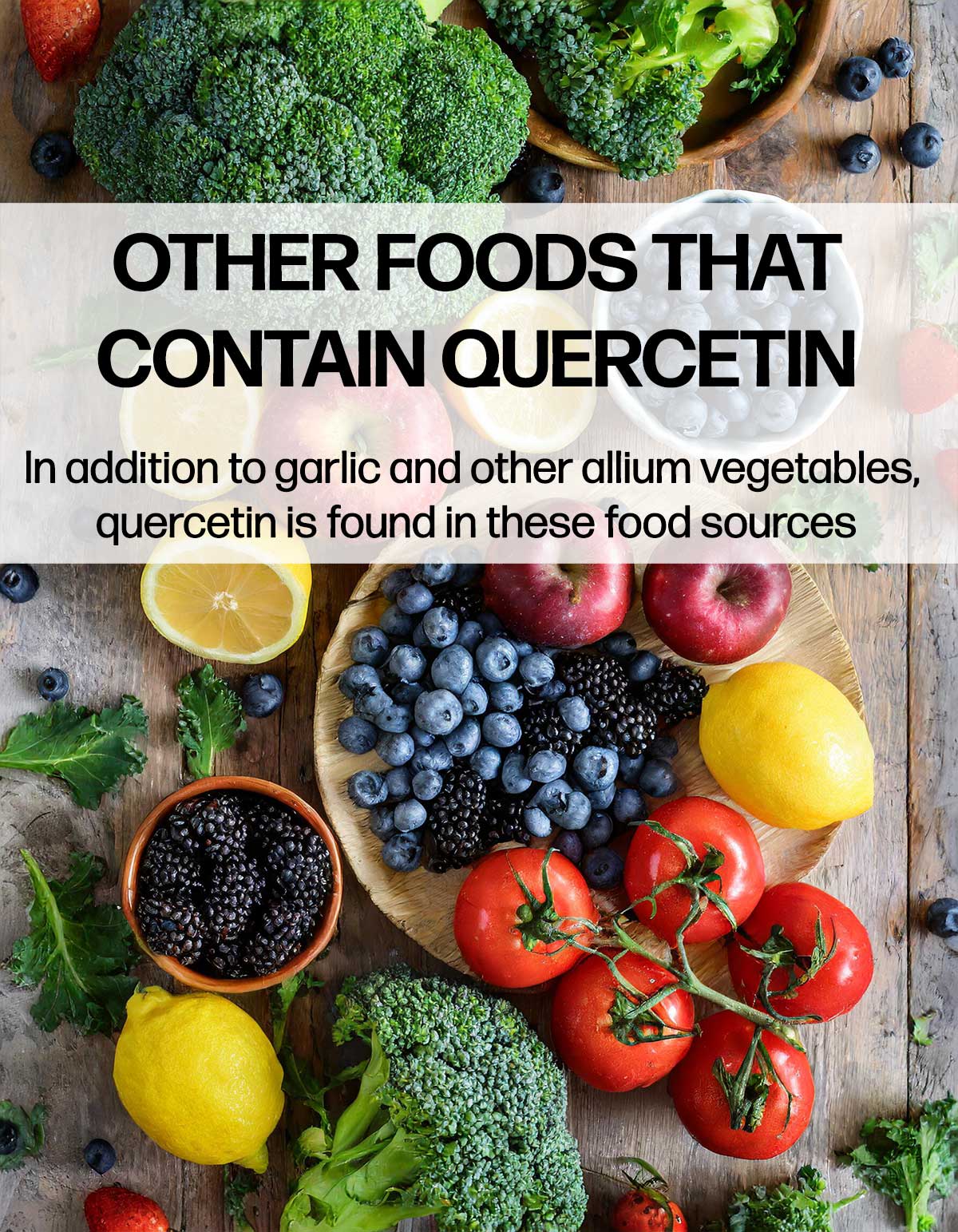
Other Foods That Contain Quercetin
In addition to garlic and other allium vegetables, quercetin is found in these food sources:
- Apples
- Berries (such as cranberries, blueberries, and raspberries)
- Citrus fruits (such as oranges, grapefruits, and lemons)
- Leafy green vegetables (such as spinach and kale)
- Cruciferous vegetables
- Red grapes
- Tomatoes
- Broccoli
- Red wine
- Certain types of tea: green tea and black tea
Questions About Quercetin in Garlic
Many people have questions about the specific benefits of quercetin in garlic and how to incorporate it into their diet. Here, we address some commonly asked questions to help you gain a better understanding of the topic.
Compare Garlic Supplements Vs Quercetin Supplements
It is generally recommended to take quercetin supplements rather than garlic supplements for the purpose of increasing quercetin intake.
Sources
- https://www.ncbi.nlm.nih.gov/pmc/articles/PMC5569348
- https://www.ncbi.nlm.nih.gov/pmc/articles/PMC6678835
- https://www.ncbi.nlm.nih.gov/pmc/articles/PMC10409574
- https://www.ncbi.nlm.nih.gov/pmc/articles/PMC8249127
- https://www.ncbi.nlm.nih.gov/pmc/articles/PMC7503351
- https://www.ncbi.nlm.nih.gov/pmc/articles/PMC8352693
- https://www.ncbi.nlm.nih.gov/pmc/articles/PMC4808895
- https://www.webmd.com/vitamins/ai/ingredientmono-294/quercetin
- https://www.metagenicsinstitute.com/blogs/quercetin-and-immune-health


